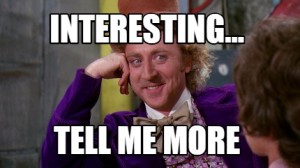
As with all car loans in Chapter 7 Bankruptcy, if you wish to keep the vehicle you must reaffirm the debt with the creditor. This is done via a Reaffirmation Agreement usually prepared by the creditor, signed by the debtor and filed with the court. So you finally receive the reaffirmation from your credit union and you happily begin to sign your name when you realize that the amount listed that you owe, is actually three times the balance you owe on the car loan! What happened?
You my friend, have been……….(queue the echo effect)……..Cross Collateralized……..dun dun duh……..
I know, you never thought it could happen to you, but it has. So what is Cross Collateralizing? I’m glad you asked.
Credit Unions are notorious for this sort of thing. You go to your beloved credit union for a car loan. You purchase your dream car and could not be happier. Several months later you go to the same credit union for a personal loan. They give you the cash and again, you could not be happier. But it is not until you see the reaffirmation that you realize what really happened.
When you signed the personal loan agreement with the credit union, you did not notice the line that stated, “A default under any Loan, Note or other Loan Document is a default under all Loans and all other Loan Documents. All of the Collateral secures all Obligations.”

As an example, if you owed $6,000 on your car loan and had a personal loan of $6,000 with the same credit union, you really owe $12,000 on your car! And if the car is only worth $5,000, then you are very upside down on the loan. And if you are completely in love with your credit union and wish to continue having credit union priviliges, then you would have to sign and agree to the reaffirmation for both loans.
But, there is an argument to made against this practice. If you do not have a vehicle loan with the credit union and you take out a personal loan, then later you obtain a vehicle loan, is it possible for a personal loan to be “secured” by future property that does not even exist at the time the personal loan contract was signed?
This argument was made many years ago, and for a short time, the practice of cross-collateralizing accounts was dropped by credit unions. Of course, over time, as with most things, people forgot about it, opinions changed and the practice was resurected. So do not be surprised when reviewing that Reaffirmation Agreement from your credit union.
So what do you do if they have cross-collaterilized your accounts? If you wish to keep your credit union privileges then your options are limited. But if you do not necessarily care about your credit union and would not mind moving your checking account to Bank of America (perish the thought) then a good alternate option would be to “Redeem” the vehicle rather than “Reaffim”.

But how can this be done? My goodness, you are full of questions. But I am happy to explain……after all, isn’t that why we are here?
There are many companies out there that will “appraise” your vehicle for it’s current value and then finance you the new lower balance. A Motion to Redeem is filed with the court and if the court approves it, the new finance company will send a check to the old finance company and payoff the debt at value of the vehicle and not the actual balance. Then you begin monthly payments to the new finance company.
The appraisal is usually free of charge, but the end numbers do not always lower the payments enough to make it worth while. But in most cases the numbers are lowered substantially. This is an option. And a good option at that. Of course, as with any legal matter, it is best to consult with an attorney first.
If redeeming the vehicle turns out not to be a viable option, another option would be to surrender the vehicle back to the credit union and let the loans discharge by your bankruptcy. But of course now you have neither the credit union privileges nor the vehicle. But being stuck with a car loan that is extemely upside down does not sound much better.
So to recap. What can you do if you find that your car loan was cross-collaterized?
- Reaffirm the entire balance.
- Redeem the vehicle for only it’s current value.
- Surrender the vehicle back to the lender.
Hard choices. But to understand them more fully and how they fit your specific situation, it is best to discuss your case with a reputable attorney. Believe it or not, they are here to help you.
For more information about bankruptcy and how we can help solve your debt problems, please visit: https://4bankruptcy.com/
Find us at: https://www.facebook.com/4bankruptcy




